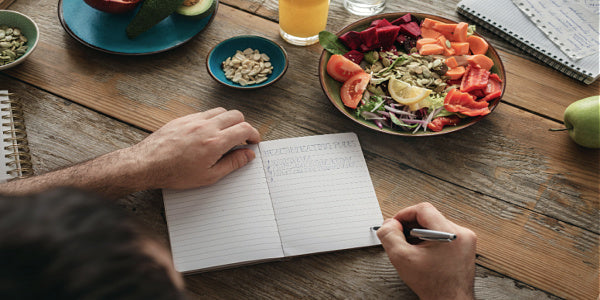
Don’t know where to start when it comes to changing your diet for the better? Learning how to keep a food journal (food diary) or journaling food intake over a certain period of time can illuminate areas for improvement.
Read on for answers to all your questions about starting a food journal for better health, including tips, benefits, and more.
What’s a Food Diary?
Also known as a food record or food journal, a food diary is a self-reported account of all the meals, snacks, beverages, and dietary supplements you eat in a day. Experts recommend recording consumption in real-time to account for what is eaten throughout the day.
Keeping a food diary takes a time investment of about 15 minutes a day, but can be a worthy pursuit in the service of wellness. In fact, with today’s technology, people can take pictures or voice recordings in real-time as they eat to help them keep track of details.
Additionally, a registered dietitian can help you start, making activities like estimating portion sizes easier. There’s no shame in using food models, visual aids, or weight scales as a help. These tools, however, are not intended to restrict intake in any manner.
The Benefits of Journaling Food Intake
The benefits of keeping a food diary are two-fold. Not only can it enable you to see your overall diet quality and intake, but it can also alert you to specific problem spots.
For example, maybe you are a relatively healthy eater during the day but slowly slip into unhealthy snack habits in the evening. A food diary is a tool that can help you identify where unhealthy eating patterns emerge.
Turns out, food diaries aren’t only useful when setting health goals at the end of the year! Anytime is a good time to start a food journal, but especially if you want help in identifying:
• What you are eating
• How much you are eating
• When are you eating
• Where are you eating
• Why are you eating
As an added benefit to getting these questions for yourself, a food journal can help you to:
• Track calories and serving sizes
• Get closer to a health or fitness goal
• Clarify cues (i.e. hunger versus stress/boredom/emotional eating)
Not surprisingly, keeping a food diary has been shown to assist in weight loss efforts. This happens, in part, since journaling food can help you to track your eating patterns as well. Many applications and methods have you track exercise, sleep, etc. in tandem, amplifying the effect that correcting unhealthy patterns can have.
How to Keep A Food Journal
So, your interest is piqued. Now, where do you start? The good news is, you can start this very second!
Try an Electronic Method
Food diaries have been around for a while. However, recent research shows that electronic methods tend to be considered more fun and easy to use than the old-school pen-and-paper methods.
Overall, dietitians and health professionals recommend using whatever method works best for you. Some prefer writing intake down over opening an app, so it is up to you and what works best!
Make It Personal
Like things short and sweet? You can make your recordings that way, too. There’s no need to record every detail (that is, unless you want to).
In other words, there’s no right or wrong way to keep track of your intake - just the way that works best for you.
Tune Into Hunger and Fullness
Recognizing hunger and fullness (also known as satiety) can be an integral part of eating behaviors. Especially in this day and age, mindlessly watching TV or your phone’s social media feed can mean mindless eating.
Instead, be in tune with your body’s hunger and fullness signals, and let them better direct more mindful eating habits.
A Final Word On Food Diaries
Whether online or as a tangible tracker, a food diary can be a helpful tool in getting closer to your goals. Find out what works for you personally, and start as soon as today!
Food journaling is a great way to become more in tune with your body and its needs.
References:
Dicken C. The Benefits of Food Journaling. Nutrition. Published October 2019. https://nutrition.org/the-benefits-of-food-journaling/.
Food Record at a Glance. National Cancer Institute. https://www.dietassessmentprimer.cancer.gov/profiles/record/.
McManus KD. Why keep a food diary? Harvard Health. Published January 2019. https://www.health.harvard.edu/blog/why-keep-a-food-diary-2019013115855.
Meroni A, Jualim N, Fuller N. ‘Boden Food Plate’: Novel Interactive Web-based Method for the Assessment of Dietary Intake. J Vis Exp. 2018;(139):57923.
Shiffer E. The Expert Guide to Keeping a Food Journal for Effective Weight Loss. Eat This, Not That! Published July 15, 2021. https://www.eatthis.com/food-journal-guide/.






